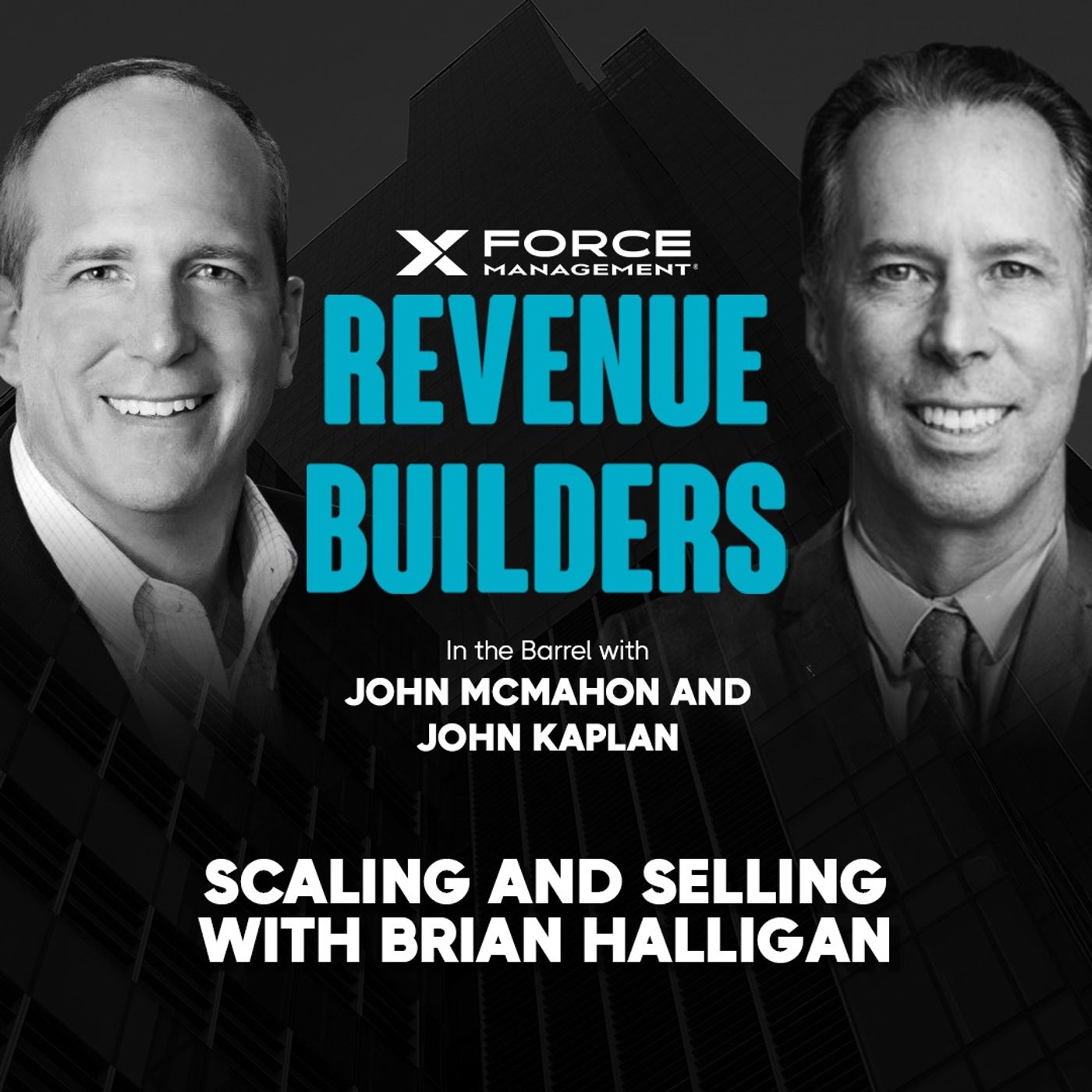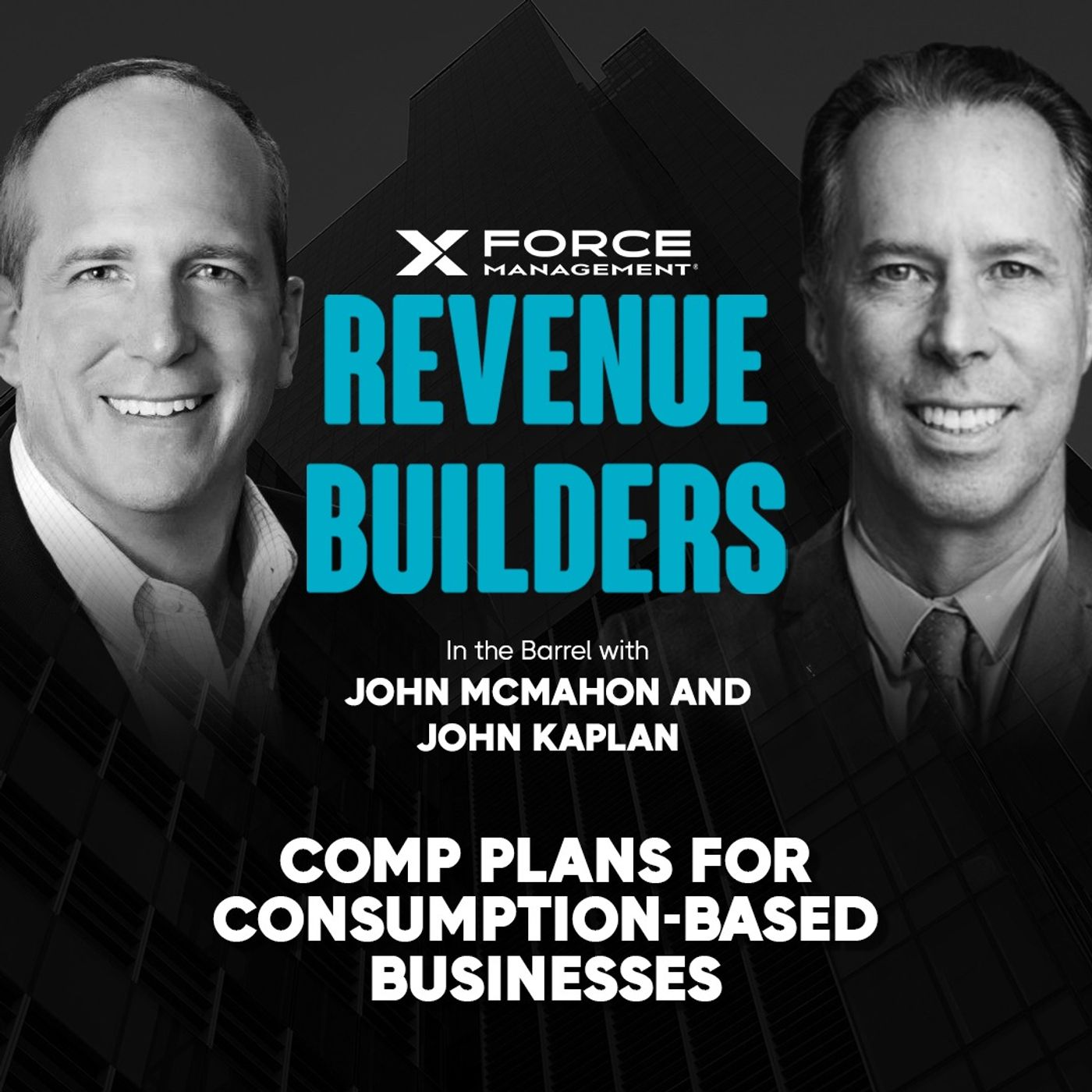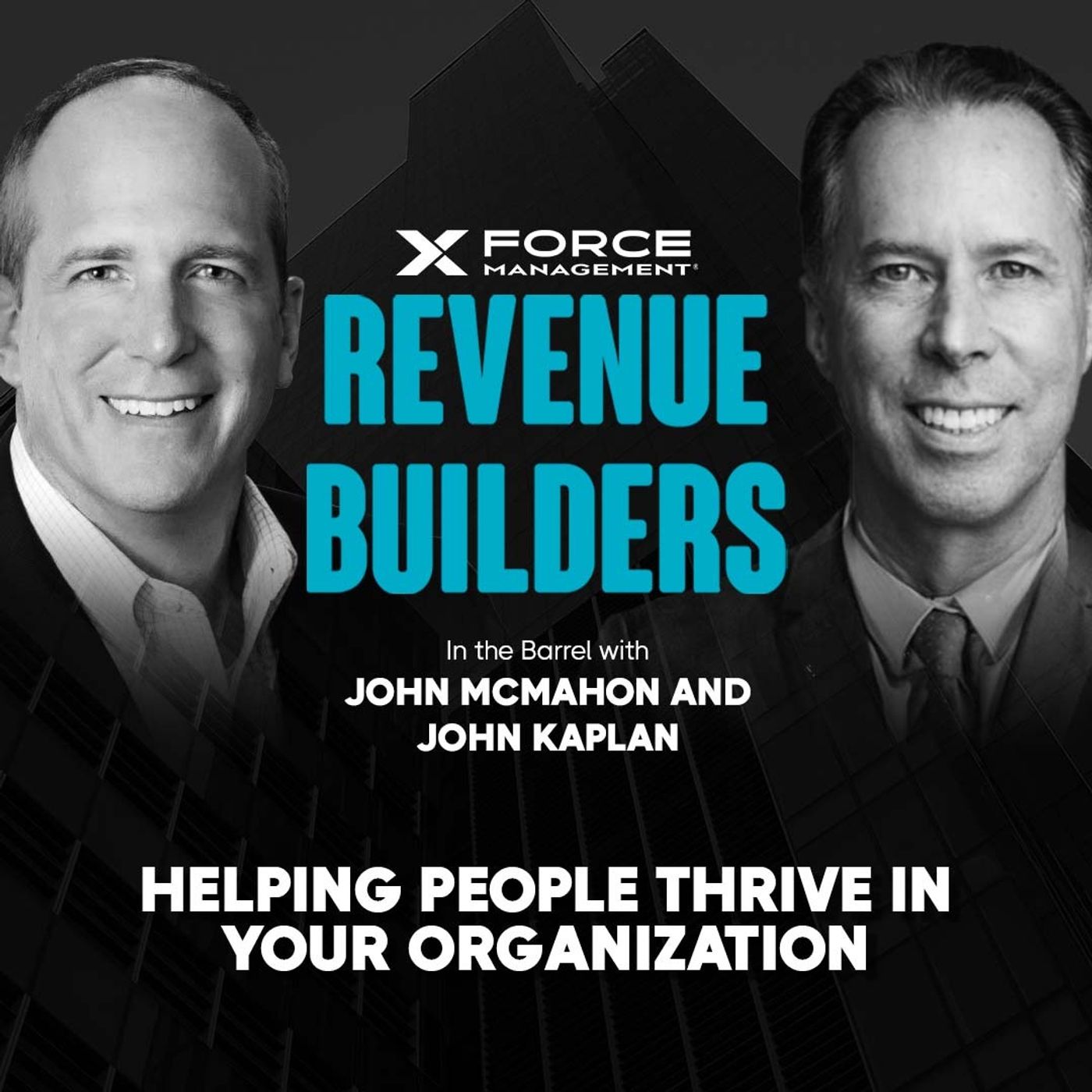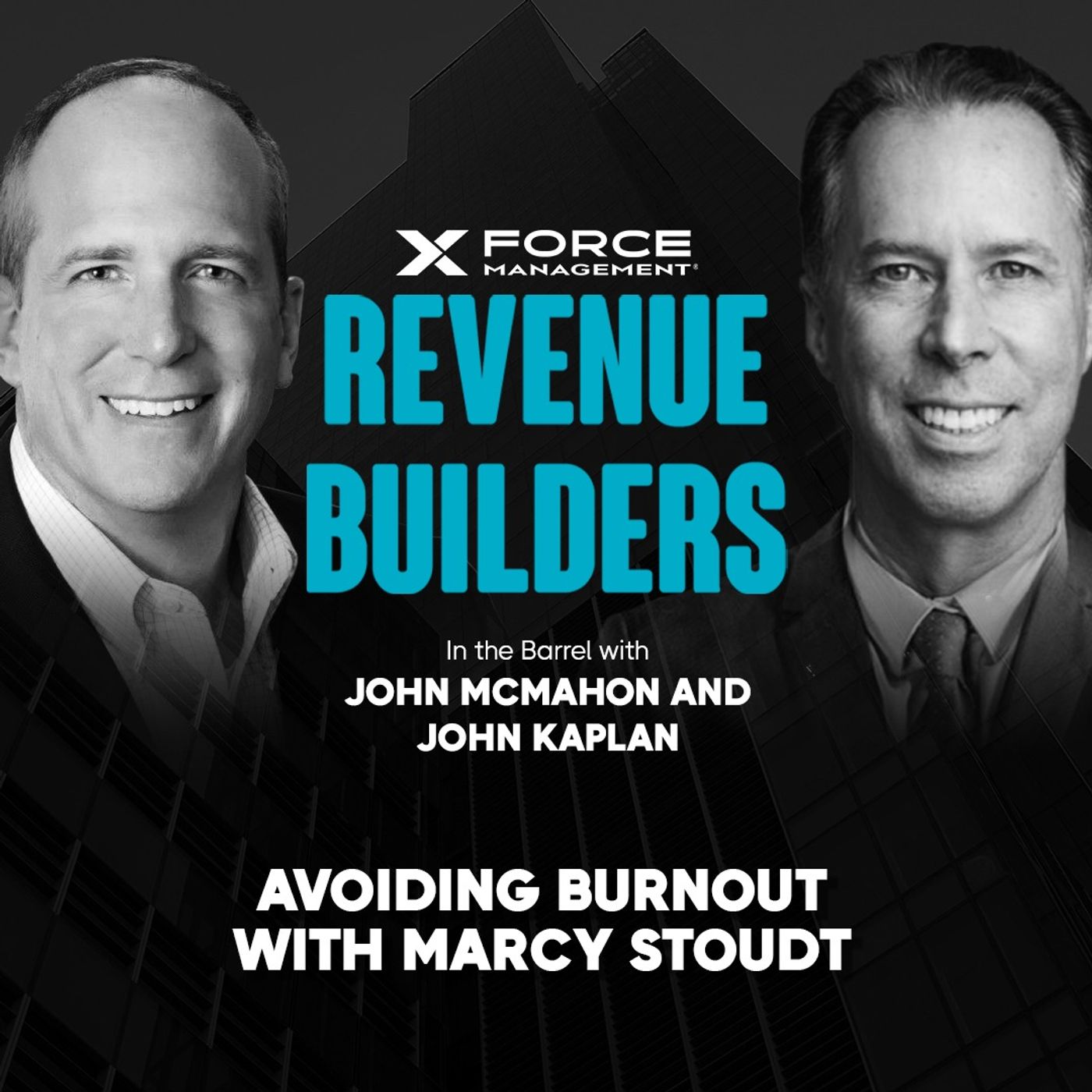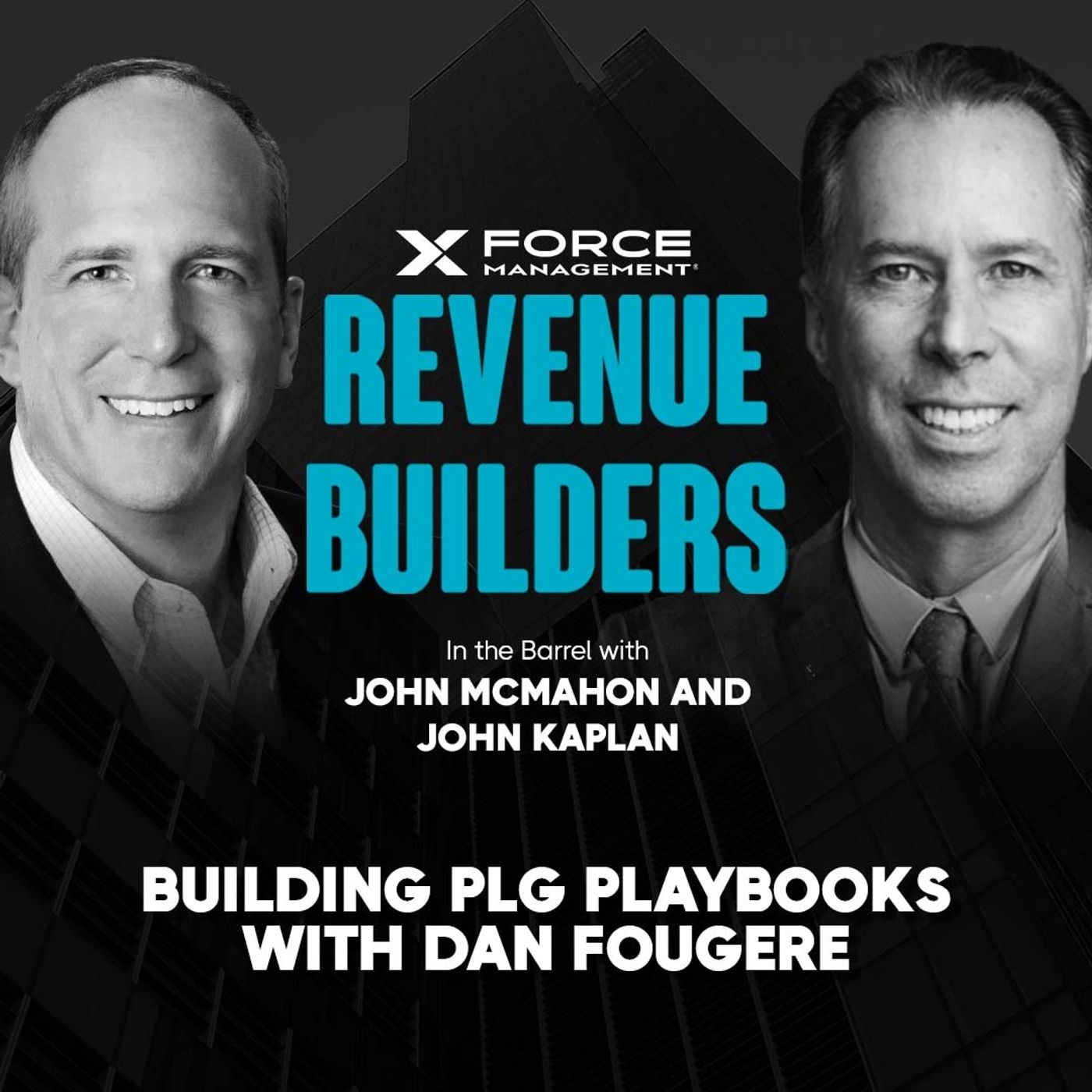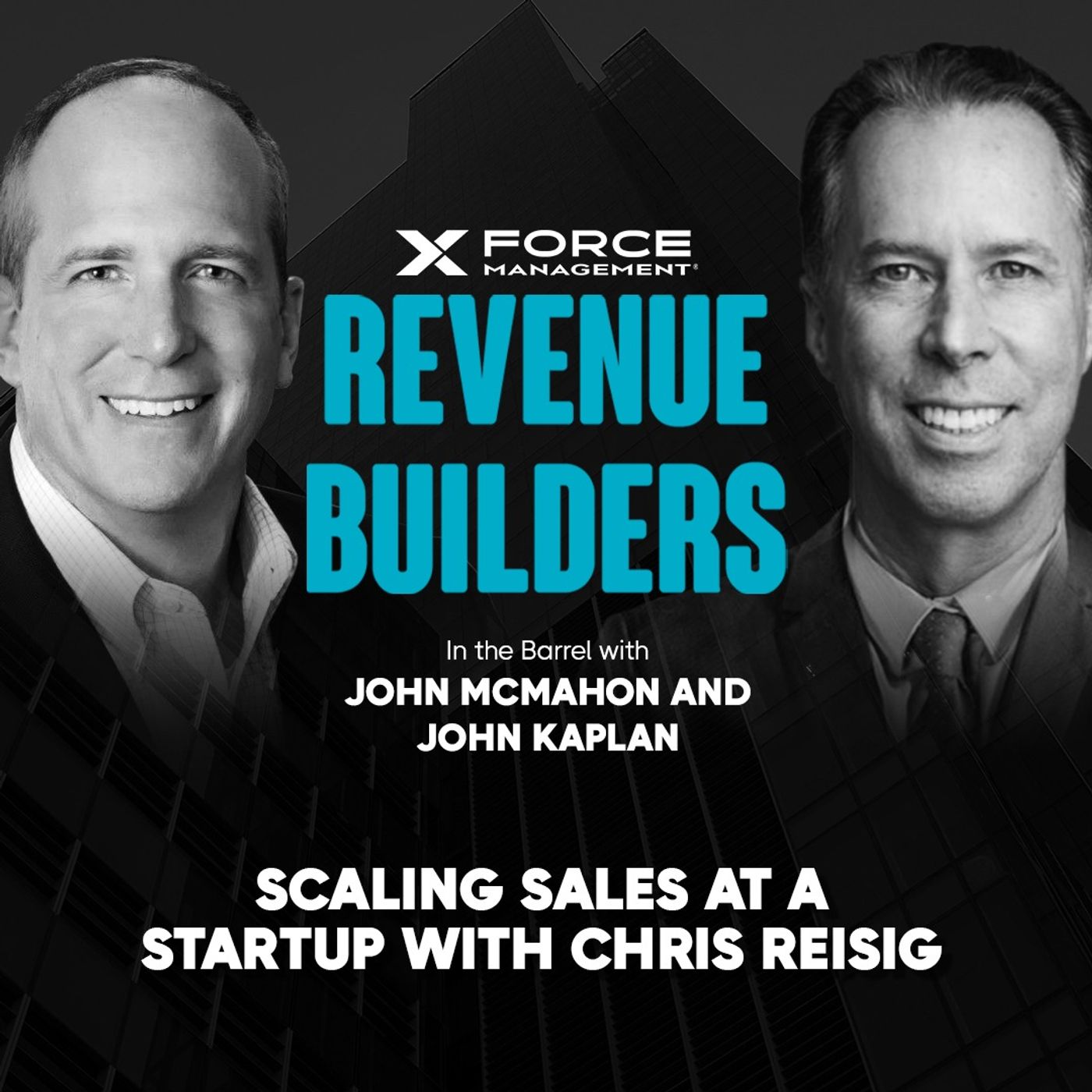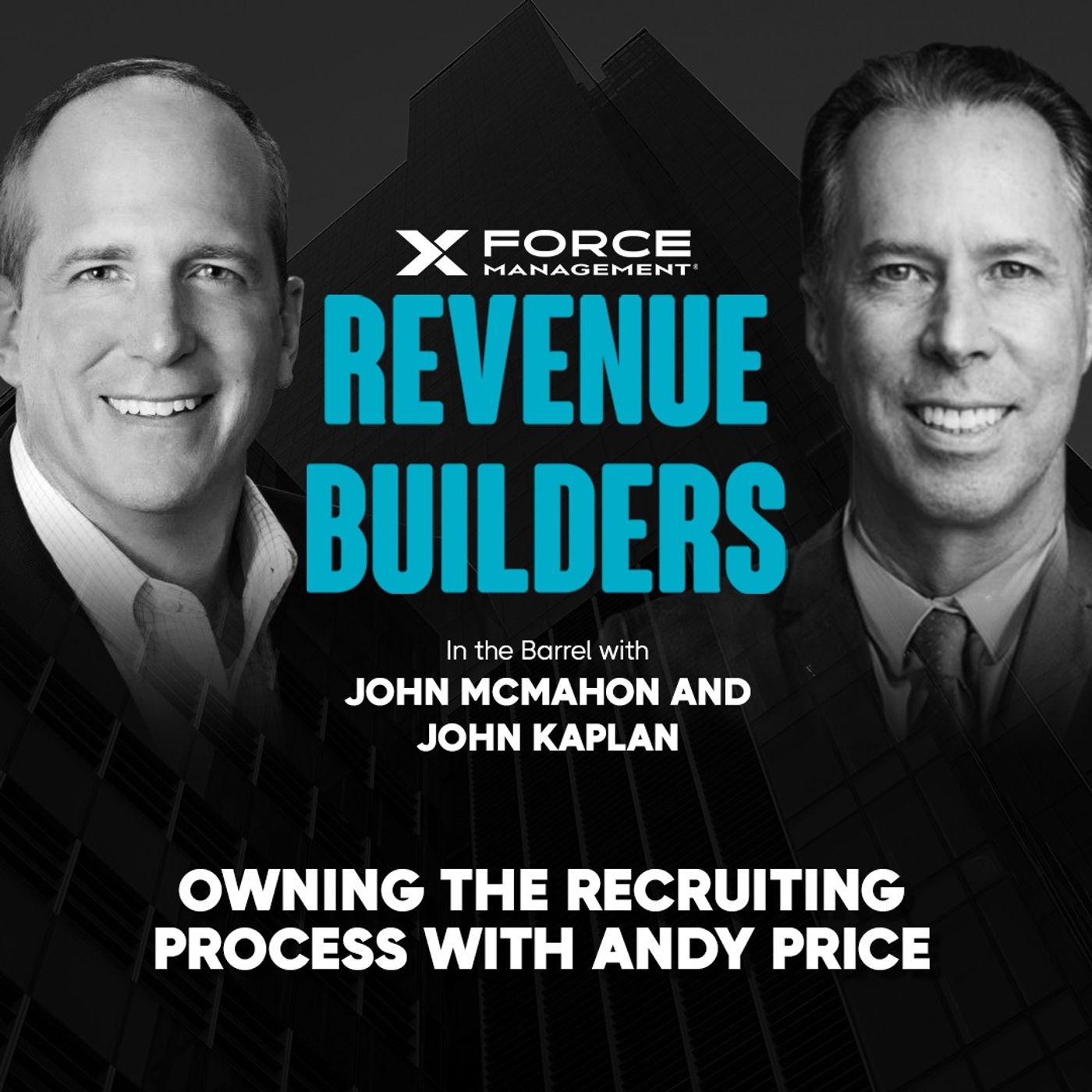Discover Revenue Builders
Revenue Builders

Revenue Builders
Author: Force Management
Subscribed: 65Played: 3,675Subscribe
Share
© 2022 - Force Management
Description
Welcome to the Revenue Builders podcast, a weekly show featuring B2B sales leaders and executives. Hosted by Five-time CRO John McMahon and Force Management’s Co-Founder John Kaplan, the show goes in the barrel, behind the scenes with the people who have been there, done that and seen the results. Revenue Builders covers the best practices for scaling and growing your business, while sharing the pitfalls to avoid. Great conversation. Solid interviews. Tangible takeaways to help you succeed. If you enjoy our content, please subscribe, rate and review the show to help us reach more people.
This show is brought to you by: Force Management where we help companies improve sales performance, executing their growth strategy at the point of sale. Check out forcemanagement.com more information.
This show is brought to you by: Force Management where we help companies improve sales performance, executing their growth strategy at the point of sale. Check out forcemanagement.com more information.
312 Episodes
Reverse
President’s Club performance is rarely about talent alone. It is built on discipline, preparation, curiosity, and the ability to lead without authority in complex, high-stakes sales environments. In this episode, Bob Kocis joins John McMahon and John Kaplan to unpack what truly separates perennial President’s Club winners from the rest of the field. Drawing on decades of enterprise sales leadership and insights from interviewing top performers across tech, Bob breaks down the habits, mindset shifts, and behaviors that drive consistent elite performance. These include agenda-free listening, proactive selling, building champions, neutralizing enemies, and staying adaptable as markets evolve.Bob Kocis is the author of The President’s Club Mindset, released in December 2025. He has held senior revenue leadership roles across global enterprise organizations for more than 20 years and has spent his career studying what drives sustained excellence in sales.Connect with Bob:WebsiteLinkedInBuy The President’s Club Mindset by Bob KocisResources:Join our live discussion with Bob Kocis on February 10, where he’ll break down President’s Club performance and answer your questions.Wondering how to drive consistent President’s Club-level performance across your entire org as a leader? Check out Force Management’s Predictable Revenue Framework.Key takeaways from this episode:02:00 – Why attitude and effort are table stakes, but curiosity is what separates elite sellers from average performers over time04:20 – How resilience and persistence create unfair advantages in long sales cycles, and why most reps quit one call too early06:00 – Why top performers attract internal resources naturally by leading without authority and acting as the quarterback of the deal14:25 – How agenda-free listening and deep preparation unlock better questions, stronger discovery, and more credible leadership with customers25:20 – Why elite sellers move at a different pace, understand their own conversion math, and operate with extreme self-awareness29:30 – How great reps turn skeptics into champions by connecting pain, solution, and personal win -- not by pushing for the close41:00 – Why the best sales leaders focus on serving their people first, and how that mindset leads to long-term success and legacy
Hosted by five-time CRO John McMahon and Force Management Co-Founder John Kaplan, the Revenue Builders podcast goes behind the scenes with the sales leaders who have been there, done that, and seen the results. This show is brought to you by Force Management. We help companies improve sales performance, executing their growth strategy at the point of sale. Connect with Us: LinkedInYouTubeForce Management
In this episode, John Kaplan and John McMahon sit down with Jeremy Duggan, President of Multiverse, to talk about a tension every manager feels: how do you genuinely care about your people while still holding them accountable? They dig into a real story of a high-potential rep who wasn’t thrilled about a big quota increase—and what it took to turn resistance into growth. Along the way, they break down how the right intent, honest conversations, and data-backed coaching can elevate performance, and they share the practical frameworks and tools that separate good managers from true leaders.Jeremy Duggan is the President of Multiverse and an advisor to high-growth technology companies navigating scale. He is known for helping leaders transition from managing outcomes to building people-first organizations that deliver extraordinary results.Connect with Jeremy:MultiverseLinkedIn
Hosted by five-time CRO John McMahon and Force Management Co-Founder John Kaplan, the Revenue Builders podcast goes behind the scenes with the sales leaders who have been there, done that, and seen the results. This show is brought to you by Force Management. We help companies improve sales performance, executing their growth strategy at the point of sale. Connect with Us: LinkedInYouTubeForce Management
Managing people and leading them are often treated as the same skill, but the gap between the two is where many organizations stall. In this replay episode, Jeremy Duggan joins the conversation to explore one of the most critical distinctions in business leadership: the difference between driving results and developing people. Drawing on real-world experience scaling multiple companies to billion-dollar valuations, Jeremy unpacks why great leaders prioritize belief, execution, and long-term growth over short-term outcomes, and why vision only works when it’s paired with disciplined follow-through. Whether you’re struggling to balance leadership with management or looking to elevate your team to extraordinary performance, this conversation reveals the principles that separate good managers from truly great leaders.Jeremy Duggan is the President of Multiverse and an advisor to high-growth technology companies navigating scale. He is known for helping leaders transition from managing outcomes to building people-first organizations that deliver extraordinary results.Connect with Jeremy:MultiverseLinkedInResources mentioned:Bill Parcells “This is why you lift all those weights” Super Bowl clipKey takeaways from this episode:04:00 – Why great leaders focus on making people great, not just making the work great, and how that mindset consistently produces stronger results08:50 – How difficult conversations, when rooted in genuine care and clear intent, become defining moments that unlock coachability and long-term growth13:30 – Why people want to be led only if they believe a leader can take them somewhere they cannot reach on their own21:00 – How vision shows where you’re going, purpose explains why it matters, and belief bridges the gap between ambition and execution34:00 – Why belief isn’t motivation. It’s built through proof, planning, and helping people see what’s possible before they can see it themselves46:00 – Why leadership without process creates empty inspiration, and management without vision limits performance and development59:30 – How true leadership legacy is measured by the people you develop and the leaders who emerge after you leave
Hosted by five-time CRO John McMahon and Force Management Co-Founder John Kaplan, the Revenue Builders podcast goes behind the scenes with the sales leaders who have been there, done that, and seen the results. This show is brought to you by Force Management. We help companies improve sales performance, executing their growth strategy at the point of sale. Connect with Us: LinkedInYouTubeForce Management
In this episode, Mark Roberge, author of the upcoming book The Science of Scaling, breaks down why so many companies fail to evolve their Ideal Customer Profile (ICP) despite changing market conditions—and reveals the surprising truth: it's emotional decision-making, not data, holding them back. Discover the game-changing "green, yellow, red" framework that separates truly ideal customers (those with high lifetime value) from those draining your resources, and learn how to strategically reallocate your team's efforts to maximize retention and expansion. Plus, explore how getting your ICP right doesn't just boost sales—it aligns your entire organization, from marketing and product development to customer success, creating a powerful go-to-market engine that drives real scaling.Mark Roberge is the founding Chief Revenue Officer of HubSpot, a senior lecturer at Harvard Business School, co-founder of Stage 2 Capital, and the author of The Science of Scaling and The Sales Acceleration Formula. He is widely known for helping companies design go-to-market systems that scale sustainably. Connect with Mark: Stage 2 CapitalResources mentioned:The Science of Scaling by Mark RobergeThe Sales Acceleration Formula by Mark RobergeForce Management resources on scaling predictably:The Predictable Revenue Framework: Guide for Leaders
Hosted by five-time CRO John McMahon and Force Management Co-Founder John Kaplan, the Revenue Builders podcast goes behind the scenes with the sales leaders who have been there, done that, and seen the results. This show is brought to you by Force Management. We help companies improve sales performance, executing their growth strategy at the point of sale. Connect with Us: LinkedInYouTubeForce Management
Scaling often looks like momentum on the surface: more pipeline, more headcount, more pressure from boards and capital. But underneath? Many leaders feel the strain of decisions moving faster than their systems can support. In this conversation, Mark Roberge sits down to unpack why scaling is not a milestone, but a system that must be intentionally designed and continuously recalibrated. Drawing on his experience as HubSpot’s founding CRO, a Harvard Business School lecturer, and the author of The Science of Scaling, Mark offers a clear, data-driven perspective on how leaders can move beyond reactive growth and build systems that scale with intention.Mark Roberge is the founding Chief Revenue Officer of HubSpot, a senior lecturer at Harvard Business School, co-founder of Stage 2 Capital, and the author of The Science of Scaling and The Sales Acceleration Formula. He is widely known for helping companies design go-to-market systems that scale sustainably. Connect with Mark: Stage 2 CapitalResources mentioned:Pre-order Mark's book now. All proceeds will be donated to McLean Hospital, a global leader in mental health research and care.The Science of Scaling by Mark RobergeThe Sales Acceleration Formula by Mark RobergeForce Management resources on scaling predictably:The Predictable Revenue Framework: Guide for LeadersKey takeaways from this episode:04:45 Why scaling too early, often triggered by capital of board pressure, creates more downstream problems than it solves09:20 Why your ideal customer profile is defined by who your sellers actually close, not what’s written in your pitch deck12:43 Why revenue is a misleading indicator of product-market fit (and what leaders should pay attention to instead)13:58 The critical difference between product-market fit and go-to-market fit, and why skipping the latter derails scale19:36 How using leading indicators of retention removes guesswork from growth decisions40:02 Why top-down revenue targets fail, and how bottoms-up capacity planning creates sustainable scale53:55 Why Mark chose to donate all book proceeds to mental health, and why leadership conversations must make room for humanity
Hosted by five-time CRO John McMahon and Force Management Co-Founder John Kaplan, the Revenue Builders podcast goes behind the scenes with the sales leaders who have been there, done that, and seen the results. This show is brought to you by Force Management. We help companies improve sales performance, executing their growth strategy at the point of sale. Connect with Us: LinkedInYouTubeForce Management
In this episode of the Revenue Builders podcast, returning guest Doug Holladay joins the show to explore why forgiveness is not just a personal virtue, but a critical leadership skill. Drawing from Doug’s book Rethinking Success and decades of leadership experience, the conversation reframes forgiveness as a way to reclaim mental bandwidth, build trust-driven cultures, and prevent resentment from quietly eroding performance. The discussion moves beyond theory into real stories, practical distinctions, and leadership behaviors that directly impact how teams operate and scale.Doug Holladay is an author, educator, and leadership advisor known for helping leaders examine the internal patterns that shape culture, decision-making, and long-term success. He is the author of Rethinking Success and a frequent contributor to conversations on leadership, humility, and organizational health.Resources mentioned:Rethinking Success by Doug HolladayThe Wounded Healer by Henri NouwenWhat Happened to You? by Bruce Perry and Oprah WinfreyKey takeaways from this episode:01:33 Why holding onto resentment quietly drains a leader’s focus, energy, and decision-making capacity10:45 What most leaders get wrong about culture, and why how you handle conflict matters more than what’s written on the wall12:28 The difference between forgiveness and reconciliation -- and why waiting for an apology keeps leaders stuck23:34 What forgiveness actually looks like in real leadership moments (and why it’s not about fairness or closure)26:44 Why leaders who avoid examining their own role in conflict rarely move forward – even when they’re “right”35:42 Why humility isn’t weakness -- and how strong leaders redirect power instead of using it defensively49:13 How shifting from “What’s wrong with them?” to “What happened to them?” changes the way leaders respond under pressure
Hosted by five-time CRO John McMahon and Force Management Co-Founder John Kaplan, the Revenue Builders podcast goes behind the scenes with the sales leaders who have been there, done that, and seen the results. This show is brought to you by Force Management. We help companies improve sales performance, executing their growth strategy at the point of sale. Connect with Us: LinkedInYouTubeForce Management
Don't miss these resources from Force Management: Read the Guide on Six Critical Priorities for Revenue Leadership in 2026: https://hubs.li/Q03JN74V0Enjoying the podcast? Sign up to receive new episodes straight to your inbox: https://hubs.li/Q02R10xN0
Hosted by five-time CRO John McMahon and Force Management Co-Founder John Kaplan, the Revenue Builders podcast goes behind the scenes with the sales leaders who have been there, done that, and seen the results. This show is brought to you by Force Management. We help companies improve sales performance, executing their growth strategy at the point of sale. Connect with Us: LinkedInYouTubeForce Management
In this short segment of the Revenue Builders Podcast, HubSpot co-founder Brian Halligan pulls back the curtain on the uncomfortable truth of scaling: there is no magic inflection point—only relentless progress, painful setbacks, and self-inflicted potholes. Brian shares how HubSpot embraced a “Pothole Report” mindset to identify unforced errors before they became existential threats, why most scaling failures are internal, and how long-term thinking—not quick exits—shaped HubSpot into a generational company. It’s a masterclass in founder mindset, operational discipline, and playing the long game in hypergrowth.KEY TAKEAWAYS[00:00:25] There is no magical hire, partnership, or customer that suddenly fixes everything—success is a grind, even in the best moments[00:01:13] The road to scale is filled with setbacks, many of which are self-inflicted rather than caused by competition[00:01:58] The “Pothole Report” helped HubSpot systematically identify mistakes, root causes, and missing metrics before small issues became big failures[00:02:32] Promoting too fast without protecting core functions can quietly break critical systems like customer support[00:03:27] In hypergrowth, people, systems, processes, and products don’t scale naturally—everything eventually breaks[00:04:28] No system, process, or role lasts more than three years without needing to be rebuilt or replaced[00:05:12] Contrary to startup mythology, acquisition opportunities are rare—even for successful, fast-growing companies[00:06:20] Founders often optimize for “local maxima” instead of anchoring their ambition against truly global category leaders[00:07:17] Aligning founder expectations early—especially around time horizon and exit scenarios—enables long-term conviction and focusQUOTES[00:00:25] “Every happy moment’s been a grind.”[00:01:13] “So many setbacks along the way. So many unforced errors.”[00:01:58] “Here’s all the potholes we have—and almost all of them we caused ourselves.”[00:03:27] “In hypergrowth mode, nothing scales. Everything breaks.”[00:04:44] “No person lasts longer than three years. No system, no process, no nothing.”[00:06:42] “We wanted to build a company our grandkids would be proud of.”[00:07:36] “We’d already made some money—so we decided to swing hard.”Listen to the full conversation through the link below.https://revenue-builders.simplecast.com/episodes/innovating-and-iterating-for-growth-with-hubspot-co-founder-brian-halliganEnjoying the podcast? Sign up to receive new episodes straight to your inbox:https://hubs.li/Q02R10xN0Check out John McMahon’s book here:Amazon Link: https://a.co/d/1K7DDC4Check out Force Management’s Ascender platform here: https://my.ascender.co/Ascender/
Hosted by five-time CRO John McMahon and Force Management Co-Founder John Kaplan, the Revenue Builders podcast goes behind the scenes with the sales leaders who have been there, done that, and seen the results. This show is brought to you by Force Management. We help companies improve sales performance, executing their growth strategy at the point of sale. Connect with Us: LinkedInYouTubeForce Management
In this short segment of the Revenue Builders Podcast, we revisit the discussion with Jose Fernandez — former Head of Global Sales Development at Google and now CEO of Easy Comp — breaks down how compensation must evolve when companies shift from traditional SaaS licensing to consumption-based models. Drawing from his experience at Google Ads, one of the most successful consumption engines in business history, Jose lays out the structural advantages of consumption models and how GTM, onboarding, forecasting, and comp plans must align to unlock growth.John McMahon and John Kaplan then expand on how consumption changes seller behavior, deal sizing, renewal dynamics, forecast accuracy, and quota mechanics. This is a must-listen for revenue leaders, sellers, and anyone navigating the industry-wide shift toward usage-based pricing.KEY TAKEAWAYS[00:00:46] Companies transitioning to consumption models often copy SaaS licensing structures instead of designing comp that amplifies consumption-driven advantages.[00:01:34] Three core advantages of consumption models: lower barrier to entry, value-aligned spend increases, and product-led expansion.[00:03:07] Aligning GTM roles — new business, onboarding, and account management — enables scale and fairness in comp.[00:03:57] Forecasting in consumption models becomes an analytical discipline, requiring predictive models rather than rep intuition.[00:05:00] High-quality customer fit at acquisition can result in massive upside — one rep earned huge commission from a $15M three-month advertiser.[00:07:02] In consumption, churn can happen in a week — sellers must ensure rapid value realization, not just contract signing.[00:08:00] Sellers often intentionally downsize initial deals to ensure burn-down and protect compensation.[00:08:59] PLG and sales-assisted models blend; comp must account for small initial usage that grows rapidly.[00:09:48] Companies balance advance payments to reps with clawbacks to protect against churn.[00:10:10] Smart sellers can land small, prove value, and convert usage to multi-year, high-value commitments.QUOTES[00:01:10] “Companies take too much inspiration from the old model instead of designing comp that amplifies the advantages of consumption.”[00:01:56] “Customer spend is directly proportional to the value they get — and their understanding of that value.”[00:02:19] “If you have an amazing product, some of that growth is going to be product-led, regardless of the sales team.”[00:03:57] “Forecasting in a consumption model is an analytical exercise — not something you ask an account executive to guess.”[00:07:54] “In consumption, a customer can use it for a week, turn it off like a light switch, and move on.”[00:08:38] “PLG might start with $500 on a credit card and scale into a major enterprise deal.”[00:09:28] “Sometimes comp gives future credit for usage trajectory — but companies will claw it back if churn happens.”[00:10:33] “There’s a lot of gold in this full episode — make sure you check it out.”Listen to the full conversation through the link below.https://revenue-builders.simplecast.com/episodes/driving-sales-behavior-with-effective-compensation-plans-with-jose-fernandezEnjoying the podcast? Sign up to receive new episodes straight to your inbox:https://hubs.li/Q02R10xN0Check out John McMahon’s book here:Amazon Link: https://a.co/d/1K7DDC4Check out Force Management’s Ascender platform here: https://my.ascender.co/Ascender/
Hosted by five-time CRO John McMahon and Force Management Co-Founder John Kaplan, the Revenue Builders podcast goes behind the scenes with the sales leaders who have been there, done that, and seen the results. This show is brought to you by Force Management. We help companies improve sales performance, executing their growth strategy at the point of sale. Connect with Us: LinkedInYouTubeForce Management
In this short segment of the Revenue Builders Podcast, we revisit the discussion with Susan Lucia Annunzio, author and CEO of the Center for High Performance. Backed by the world’s first global quantitative study on accelerated growth, Lucia reveals the single biggest differentiator of companies that grow profitably over the long term: how they treat their people.She introduces the concept of Return on Brainpower—the idea that organizations unlock disproportionate performance when they allow their smart people to think, challenge assumptions, and interpret intent rather than simply follow orders. Through research insights and real-world leadership examples, the conversation explores how leaders can shift from transactional management to transformational development, empowering people to deliver results beyond expectations.KEY TAKEAWAYS[00:00:52] The real driver of long-term profitable growth is how companies treat their people.[00:01:13] Even the best strategy fails when employees aren’t empowered to think for themselves.[00:02:35] “Return on Brainpower” is a leadership metric that fuels performance and innovation.[00:03:00] Micromanagement prevents people from using their full cognitive capacity.[00:04:40] The #1 global growth differentiator: treating smart people like they’re smart.[00:05:33] Commander's Intent enables employees to interpret purpose, not just follow steps.[00:07:30] Leaders must adapt to inner-directed vs. outer-directed personality wiring.[00:08:23] Psychological safety determines whether people speak up or stay silent.QUOTES[00:00:52] “How companies make money that lasts comes down to how human beings at your corporation are treated.”[00:01:13] “A great strategy without allowing people to use their brains will never maximize its potential.”[00:02:35] “The secret to success is return on brainpower.”[00:03:00] “Companies leave money on the table because they don’t allow people to challenge assumptions.”[00:04:40] “My boss tells me what to do, not how to do it.”[00:04:14] “The best leaders develop people so well that they don’t need them anymore.”[00:08:23] “Show your thinking—not ask the boss for theirs.”Listen to the full conversation through the link below.https://revenue-builders.simplecast.com/episodes/leadership-generational-insights-and-the-power-of-people-with-susan-lucia-annunzioEnjoying the podcast? Sign up to receive new episodes straight to your inbox:https://hubs.li/Q02R10xN0Check out John McMahon’s book here:Amazon Link: https://a.co/d/1K7DDC4Check out Force Management’s Ascender platform here: https://my.ascender.co/Ascender/
Hosted by five-time CRO John McMahon and Force Management Co-Founder John Kaplan, the Revenue Builders podcast goes behind the scenes with the sales leaders who have been there, done that, and seen the results. This show is brought to you by Force Management. We help companies improve sales performance, executing their growth strategy at the point of sale. Connect with Us: LinkedInYouTubeForce Management
In this short segment of the Revenue Builders Podcast, we revisit the discussion with Dean Otto, a top-performing enterprise sales rep whose life changed in an instant after being struck by a vehicle while cycling. Given a 2% chance of ever walking again, Dean went on to run a half-marathon just one year later—alongside the man who hit him and the neurosurgeon who operated on him.Through forgiveness, faith, relentless work, and a refusal to isolate, Dean rebuilt not only his body but also a powerful community around him. In this clip, he shares the inside story of meeting the driver, reconciling in the hospital, training against all odds, and ultimately proving what grit and connection can achieve. This excerpt is a masterclass in resilience, leadership, and the compounding power of not going through adversity alone.KEY TAKEAWAYS[00:00:29] The accident that changed everything.Dean’s 2% chance of walking again and the comeback mission it sparked.[00:01:14] Forgiveness before reconciliation.Dean had forgiven the driver before ever meeting him — a testament to emotional and spiritual maturity.[00:02:02] Will, the driver, reaches out.The surprising request from the man who hit Dean and how that meeting turned into a two-hour connection.[00:03:21] Rebuilding relationships through shared struggle.Dean, Will, and their families build deep bonds and ultimately commit to running together.[00:03:53] Viral impact & platform responsibility.How Dean’s story went viral and why he shifted the focus to helping other spinal cord patients.[00:04:52] Returning to work despite severe injury.Balancing recovery with career identity — including Dean closing deals from his hospital bed.[00:06:21] A doctor becomes a runner.Dean’s neurosurgeon trains for his own half marathon to stand beside his patient.[00:07:52] Integrity and sacrifice.Will joins the race despite a heart condition, symbolizing commitment far beyond obligation.[00:09:48] A race about more than racing.Dean breaks two hours by five seconds, proving to himself and others what’s possible after trauma.[00:10:24] Going back for your people.Dean and the team return to finish the race with Will — the metaphor for leadership and connection.[00:11:12] Isolation kills progress.Communities, companies, and sellers fail alone — but win together.QUOTES[00:01:14] “When I read that part of your story, I was like, whoa — forgiveness and reconciliation.”[00:07:52] “The integrity and thoughtfulness of this young man was unbelievable.”[00:11:12] “Sellers don’t make it in isolation. Companies don’t make it in isolation.”Listen to the full conversation through the link below.https://revenue-builders.simplecast.com/episodes/the-power-of-belief-with-dean-ottoEnjoying the podcast? Sign up to receive new episodes straight to your inbox:https://hubs.li/Q02R10xN0Check out John McMahon’s book here:Amazon Link: https://a.co/d/1K7DDC4Check out Force Management’s Ascender platform here: https://my.ascender.co/Ascender/
Hosted by five-time CRO John McMahon and Force Management Co-Founder John Kaplan, the Revenue Builders podcast goes behind the scenes with the sales leaders who have been there, done that, and seen the results. This show is brought to you by Force Management. We help companies improve sales performance, executing their growth strategy at the point of sale. Connect with Us: LinkedInYouTubeForce Management
Thank you for being part of the Revenue Builders community! We’re grateful for your support and feedback, which helps us deliver the content you love. If you enjoy the show, don’t forget to subscribe, rate, and review—it truly makes a difference. Here’s to finishing the year strong!Enjoying the podcast? Sign up to receive new episodes straight to your inbox: https://hubs.li/Q02R10xN0Read the Guide on Six Critical Priorities for Revenue Leadership in 2026: https://hubs.li/Q03JN74V0Explore Force Management’s Free SKO Planning Resources: https://hubs.li/Q03K94cs0
Hosted by five-time CRO John McMahon and Force Management Co-Founder John Kaplan, the Revenue Builders podcast goes behind the scenes with the sales leaders who have been there, done that, and seen the results. This show is brought to you by Force Management. We help companies improve sales performance, executing their growth strategy at the point of sale. Connect with Us: LinkedInYouTubeForce Management
In this special Revenue Builders Rewind episode, we revisit our powerful first conversation with Doug Holladay, CEO & founder of PathNorth and author of Rethinking Success: Eight Essential Practices for Finding Meaning in Work and Life. Doug shares his unconventional career journey and explores his philosophy on leadership, purpose, and living a more intentional life.The discussion dives into the importance of authenticity, gratitude, and meaningful relationships, as well as the value of understanding your own story and embracing vulnerability. Doug also highlights why many people need to rethink how they define both personal and professional success. He offers practical exercises for uncovering purpose and explains how simple rituals can help ground your life in reflection and gratitude.Stay tuned for more episodes with Doug as we continue our series with him in 2026.ADDITIONAL RESOURCESConnect with J. Douglas Holladay:https://www.linkedin.com/in/dougholladay/Listen to the earlier episodes with Doug - each one delves into a different aspect of successful business leadership: The Power of Gratitude: https://www.forcemanagement.com/the-power-of-gratitude-an-in-depth-discussion-with-douglas-holladayKnowing Your Story: https://revenue-builders.simplecast.com/episodes/know-your-story-to-achieve-true-success-with-doug-holladayRethinking Success and Finding Purpose: https://www.forcemanagement.com/rethinking-success-and-finding-purpose-with-doug-holladayLearn more about Doug’s CEO programs: https://www.pathnorth.com/Read the Guide on Six Critical Priorities for Revenue Leadership in 2026: https://hubs.li/Q03JN74V0Explore Force Management’s Free SKO Planning Resources: https://hubs.li/Q03K94cs0Enjoying the podcast? Sign up to receive new episodes straight to your inbox: https://hubs.li/Q02R10xN0HERE ARE SOME KEY SECTIONS TO CHECK OUT[00:03:38] Finding Purpose and Passion[00:04:27] Understanding Life Patterns[00:07:17] The Impact of Family Stories[00:18:48] Authentic Leadership and Vulnerability[00:34:10] The Importance of Knowing People's Stories[00:37:30] Understanding Personal Stories[00:38:34] Pandemic-Induced Self-Reflection[00:39:31] Pain as a Catalyst for Change[00:41:14] Traits of Great Leaders[00:46:08] Founding PathNorth[00:56:55] The Power of Gratitude[01:03:24] Rapid Fire QuestionsHIGHLIGHT QUOTES[00:04:22] “Put your life in five-year blocks... What did you love doing and what did others say you were good at?”[00:06:59] “Most of us get eclipsed by the money chase.”[00:07:59] “If you don’t create space to think and feel, you’ll be one of those whose light goes out.”[00:10:50] “We’re all born in someone else’s story.”[00:13:21] “The story you have seen will be your family unless you break those patterns.”[00:16:13] “Our point of identity is not our strength, it’s our brokenness.”[00:18:37] “Meaning is what you want to go for. You can be in the most godawful situations and still find meaning.”[00:22:17] “Everybody has a story. The most successful people are the ones who let people tell their stories.”[00:27:09] “When the price of making more begins to do bad things to my soul, it’s time to leave.”[00:28:40] “Gratitude is the only emotion that cannot share space with any other emotion.”
Hosted by five-time CRO John McMahon and Force Management Co-Founder John Kaplan, the Revenue Builders podcast goes behind the scenes with the sales leaders who have been there, done that, and seen the results. This show is brought to you by Force Management. We help companies improve sales performance, executing their growth strategy at the point of sale. Connect with Us: LinkedInYouTubeForce Management
In this curated episode of the Revenue Builders Podcast, we talk burnout with Marcy Stoudt, CEO and co-founder of Revel Coach. Marcy helps leaders avoid burnout and become their best selves without sacrificing success in either area. In this segment, she covers a few tips for avoiding burnout.KEY TAKEAWAYS[00:00:27] Burnout affects individuals beyond just moms, particularly leaders who lose perspective and struggle to lead effectively when overwhelmed.[00:01:45] Your attitude towards upcoming challenges greatly influences burnout; maintaining a positive mindset is key.[00:02:25] Adopt a daily practice of living "above the line," clarifying your vision and taking action aligned with your desired self.[00:04:36] Recognize and address negative events and emotions that contribute to burnout, working to stay "above the line."[00:05:55] Clear clutter from your schedule, aligning commitments with your vision of success and avoiding unnecessary tasks.HIGHLIGHT QUOTES[00:01:03] "There's a fine line between working too hard and being addicted... It's real and you can't generically say how to prevent it."[00:02:47] "Living above the line... You're defining who you want to be more often."[00:05:19] "Clearing clutter from her calendar is really important and just doing it to align to her vision of success with no comparison."[00:07:34] "Being honest with yourself about the addiction... my inability to extricate myself... became a self-fulfilling prophecy."Listen to the full episode with Marcy Stoudt through this link:https://revenue-builders.simplecast.com/episodes/mastering-work-life-balance-with-marcy-stoudtCheck out John McMahon’s book here:Amazon Link: https://a.co/d/1K7DDC4Check out Force Management’s Ascender platform here: https://my.ascender.co/Ascender/
Hosted by five-time CRO John McMahon and Force Management Co-Founder John Kaplan, the Revenue Builders podcast goes behind the scenes with the sales leaders who have been there, done that, and seen the results. This show is brought to you by Force Management. We help companies improve sales performance, executing their growth strategy at the point of sale. Connect with Us: LinkedInYouTubeForce Management
In this episode of the Revenue Builders Podcast, our host John Kaplan is joined by Dean Otto, an endurance athlete with a background in senior strategic global account sales. Dean shares his journey of recovery after a near-fatal cycling accident that left him with a 2% chance of ever walking again. His incredible story is a testament to the power of resilience and purpose, from overcoming immense physical challenges to running a half-marathon with the driver who hit him and the surgeon who saved his life. Dean provides insights into his mindset, the importance of community and forgiveness, and how he's turned his adversity into a mission to help others. The episode also delves into his guiding principles of courage, commitment, conditioning, and the importance of intellectual and spiritual fitness. Tune in for a powerful and motivational story of overcoming the odds.ADDITIONAL RESOURCESBuy Dean’s Book and Book Dean as a Speaker: https://deanottospeaking.com/Connect with Dean: linkedin.com/in/deanottospeakingRead the Guide on Six Critical Priorities for Revenue Leadership in 2026: https://hubs.li/Q03JN74V0Explore Force Management’s Free SKO Planning Resources: https://hubs.li/Q03K94cs0Enjoying the podcast? Sign up to receive new episodes straight to your inbox: https://hubs.li/Q02R10xN0HERE ARE SOME KEY SECTIONS TO CHECK OUT[00:01:15] Meet Dean Otto: A Story of Resilience[00:02:32] The Life-Changing Accident[00:06:00] Dean's Journey to Recovery[00:08:57] Overcoming Addiction and Finding Support[00:15:40] The Power of Forgiveness and Reconciliation[00:17:49] Miraculous Recovery and New Beginnings[00:33:32] Comeback Race and Heart Condition[00:34:07] Four Perspectives in the Book[00:34:56] Half Marathon Achievement[00:37:46] Turning Adversity into a Mission[00:39:16] Seizures and Medical Challenges[00:42:31] Speaking Engagements and Impact[00:51:02] Framework for SuccessHIGHLIGHT QUOTES[00:06:18] "We always revert to our training—make your training intentional."[00:16:07] "Isolation is the biggest enemy."[00:30:59] "Courage just means showing up."[00:35:54] "I'm not an outcome guy. I'm an input guy."[00:36:10] "If I've got a great attitude and I take the next right action, chances are the outcome's gonna be pretty great."
Hosted by five-time CRO John McMahon and Force Management Co-Founder John Kaplan, the Revenue Builders podcast goes behind the scenes with the sales leaders who have been there, done that, and seen the results. This show is brought to you by Force Management. We help companies improve sales performance, executing their growth strategy at the point of sale. Connect with Us: LinkedInYouTubeForce Management
In this segment, Dan Fougere breaks down how Product-Led Growth (PLG) fundamentally changes the traditional sales playbook. Drawing from his experience at Datadog and advising startups, he explains that PLG companies must rethink how they engage prospects—especially when users begin interacting with the product before any formal sales conversation.Dan emphasizes the importance of usage signals—such as downloading the product or reading documentation—as triggers for sales outreach. He also discusses the risk of force-fitting old playbooks into new environments and advocates for a first principles approach: understanding how users buy, how they use the product, and what commercial conversations are relevant at each stage.On this Veterans Day Week, check out one of the charities that’s important to Dan.https://www.nplboutdoors.org/The No Person Left Behind Outdoors charity works with combat veterans to provide outdoor experiences to foster camaraderie, promote wellness, and celebrate resilience. They do everything from hiking trips to Kilimanjaro to turkey hunts. Support their important work.
Hosted by five-time CRO John McMahon and Force Management Co-Founder John Kaplan, the Revenue Builders podcast goes behind the scenes with the sales leaders who have been there, done that, and seen the results. This show is brought to you by Force Management. We help companies improve sales performance, executing their growth strategy at the point of sale. Connect with Us: LinkedInYouTubeForce Management
In this episode of the Revenue Builders Podcast, our hosts John Kaplan and John McMahon dive deep into the world of Sales Kickoff (SKO) events. They discuss the critical importance of aligning SKO content with sales rep needs, emphasizing that it should be more than just an event—it should be a holistic process aimed at motivating and educating the sales force. The conversation covers the significance of training, the role of tools and AI in sales, and the pivotal role of frontline managers in driving sales team performance. They also share practical advice on crafting effective compensation plans and highlight the essential skills and knowledge that sales reps need for success. The episode is a must-listen for B2B sales leaders who are preparing for the upcoming SKO season and looking to drive impactful results.ADDITIONAL RESOURCESExplore Force Management’s Free SKO Planning Resources: https://hubs.li/Q03K94cs0Read the Guide on Six Critical Priorities for Revenue Leadership in 2026: https://hubs.li/Q03JN74V0See Force Management’s SKO Results: https://hubs.li/Q03RQM-V0Enjoying the podcast? Sign up to receive new episodes straight to your inbox: https://hubs.li/Q02R10xN0HERE ARE SOME KEY SECTIONS TO CHECK OUT[00:01:15] Kickoff: SKO Season Insights[00:01:45] The Importance of SKO Planning[00:02:29] Effective SKO Content and Structure[00:08:28] Leveraging AI and Tools in Sales[00:18:58] Challenges in Sales Processes and Tools[00:28:13] Training and Development for Sales Success[00:37:11] The Brady Rule and Skill Development[00:37:52] Role Playing and Live Interactions[00:39:17] The Importance of Leading by Example[00:45:09] Essential Sales Skills[01:00:53] The Role of Frontline Sales Managers[01:06:16] The Importance of Comp PlansHIGHLIGHT QUOTES[00:02:29] "It's a process, not an event. As a CRO, use the SKO to motivate, align on goals, and focus on training—not just boring org charts."[00:04:37] "If you don't sit in the seat of the participant, you are going to bore people to tears."[00:11:18] "Don't tell me about another tool unless it's really going to help me sell."[00:47:21] "You have to figure out who is sitting in that audience, resonate with them, and know what outcome you want when the meeting is over."[01:20:21] "Listening is number one. Most people are awful listeners, and most salespeople can't wait to talk."[01:53:06] "The job of the frontline sales manager is so critical, and they're the last people to get trained."[01:59:45] "I cannot fathom going into an SKO at the beginning of the year and not having comp plans done."
Hosted by five-time CRO John McMahon and Force Management Co-Founder John Kaplan, the Revenue Builders podcast goes behind the scenes with the sales leaders who have been there, done that, and seen the results. This show is brought to you by Force Management. We help companies improve sales performance, executing their growth strategy at the point of sale. Connect with Us: LinkedInYouTubeForce Management
In this episode of The Revenue Builders Podcast hosted by John McMahon and John Kaplan, Chris Reising, a five-time Chief Revenue Officer (CRO) with extensive experience in scaling sales at early-stage tech companies, shares invaluable insights into the challenges and strategies involved in scaling sales functions for startups. From finding product-market fit to hiring the right sales reps and understanding the importance of pain points, this conversation provides a comprehensive guide for entrepreneurs looking to grow their businesses.KEY TAKEAWAYS[00:01:17] In the early stages of a startup, you must wear multiple hats, including being a product manager and a sales professional. Understanding the ICP and gathering customer insights are crucial.[00:02:31] The early days of a startup involve learning every day, attending sales meetings, understanding objections, and identifying the value your technology brings. Effective communication with the product team is key.[00:04:05] Investor relations play a significant role. Early-stage investors look for different data points, and their feedback can be invaluable in understanding market signals.[00:06:11] The importance of prioritizing technology components based on customer pain points and the potential to generate immediate revenue.[00:07:44] Recognizing a recurring pattern in sales discussions where customers react positively to specific functionalities is a sign of repeatability and scalability.[00:09:05] Founders who want to remain deeply involved in the sales process need guidance on when to step back. It's a common challenge in early-stage startups.[00:12:42] Breaking down a grand vision into bite-sized chunks of value that address specific business problems is crucial for achieving repeatability and market success.[00:13:30] Expanding the vision is essential but keeping the framework simple enough for the market and sales team to understand and execute is key to early-stage success.[00:13:50] The importance of focusing sales efforts on the most productive areas and avoiding the mistake of spreading sales teams too thin.HIGHLIGHT QUOTES[00:06:56] "When you start to recognize a recurring pattern...you start to say, 'Now I have some sense of repeatability,' and that's really important."[00:10:08] "There's a huge difference between a first and second-time founder...you need to help them understand that stepping away is an important part of growing the business."[00:13:01] "Recognize you've got to break that big vision down into bite-sized chunks that can be digested by your go-to-market team and by the market, by customers."[00:13:30] "Where are we going to place our salespeople? Where are they going to be the most productive? That's really a key point."Listen to the full episode with Chris Reisig in this link:https://revenue-builders.simplecast.com/episodes/building-a-scalable-culture-with-chris-reisigEnjoying the podcast? Sign up to receive new episodes straight to your inbox:https://hubs.li/Q02R10xN0Check out John McMahon’s book here:Amazon Link: https://a.co/d/1K7DDC4
Hosted by five-time CRO John McMahon and Force Management Co-Founder John Kaplan, the Revenue Builders podcast goes behind the scenes with the sales leaders who have been there, done that, and seen the results. This show is brought to you by Force Management. We help companies improve sales performance, executing their growth strategy at the point of sale. Connect with Us: LinkedInYouTubeForce Management
In this episode of the Revenue Builders Podcast, our hosts John Kaplan and John McMahon are joined by Dan Fougere, a venture partner at Index Ventures and former CRO of Datadog. Dan shares insights from his extensive sales career, emphasizing the importance of developing adaptive and context-specific sales playbooks. He discusses the evolution of PLG (Product-Led Growth) strategies, the integration of AI in sales processes, and the critical need for continuous learning and adaptability. The episode also touches on Dan's philanthropic efforts, including his involvement with Homes for Our Troops and other charitable initiatives.ADDITIONAL RESOURCESConnect and learn more from Dan Fougere.Connect with Dan on LinkedIn: https://www.linkedin.com/in/danfougere/Support Homes For Our Troops: https://www.hfotusa.orgSupport Imagine Reading: https://imaginereading.com/Support No Person Left Behind Outdoors: https://www.nplboutdoors.orgRead the Guide on Six Critical Priorities for Revenue Leadership in 2026: https://hubs.li/Q03JN74V0Enjoying the podcast? Sign up to receive new episodes straight to your inbox: https://hubs.li/Q02R10xN0HERE ARE SOME KEY SECTIONS TO CHECK OUT[00:02:24] Advice for New Sales Leaders[00:02:52] Adapting Sales Playbooks[00:03:27] The Importance of Flexibility in Sales Strategies[00:03:54] Understanding Product-Led Growth (PLG)[00:06:44] Case Study: Datadog's Sales Evolution[00:07:57] Challenges in Scaling Sales Strategies[00:08:51] Building a Sales Organization for the Future[00:12:14] The Role of a CRO in Modern Sales[00:14:48] Adapting to Market Changes[00:26:23] Traits of Effective Sales Leaders[00:34:03] The Tip of the Spear: Leading from the Front[00:34:16] Medallia: Building a Sales Process from Scratch[00:36:58] Profile of a Successful Sales Leader[00:37:47] Recruiting and Building a High-Performance Team[00:39:25] The Importance of High Standards in Hiring[00:52:41] AI's Impact on Sales and Forecasting[01:02:07] Giving Back: Charitable EndeavorsHIGHLIGHT QUOTES[00:03:21] “A big mistake is trying to force fit a playbook from a previous company into a new company.”[00:06:01] “Approach it with a beginner’s mind… it’s actually an advantage you only get once.”[00:10:55] “Build your outbound before you need it, because at some point you’re going to need it.”[00:13:33] “98.5% of companies realize, ‘I wish I had a great sales organization to go with this great PLG motion.’”[00:19:07] “The thing that tops people out is the inability to adapt and collaborate—they become too rigid.”[00:22:25] “If you know in your heart your team is mediocre, you’re never going to be great. Raise those standards.”[00:31:36] “Don’t just assume you can get rid of BDRs and have AI do it. I don’t see anybody telling me that’s working yet."
Hosted by five-time CRO John McMahon and Force Management Co-Founder John Kaplan, the Revenue Builders podcast goes behind the scenes with the sales leaders who have been there, done that, and seen the results. This show is brought to you by Force Management. We help companies improve sales performance, executing their growth strategy at the point of sale. Connect with Us: LinkedInYouTubeForce Management
In this curated episode of the Revenue Builders Podcast, John McMahon and John Kaplan are joined by Andy Price from Artisanal Ventures and Artisanal Talent. With over 30 years of experience in the recruiting industry, Andy shares valuable insights on why it's crucial for sales leaders to own the recruiting process. The discussion delves into the pitfalls of delegating recruitment to HR, the importance of building a strong internal talent acquisition team, and the impact of recruiting quality talent on overall sales success.KEY TAKEAWAYS[00:00:41] The Importance of Sales Leaders Owning the Recruiting Process[00:00:53] Pitfalls of Delegating Recruitment to HR[00:01:36] Building an Internal Talent Acquisition Muscle[00:02:15] The Impact of Economic Changes on Recruiting Strategies[00:02:53] The Importance of Consistency in Sales Team DNA[00:03:47] The Role of Networks in Successful Recruiting[00:05:02] Evaluating Sales Leaders Based on Their Recruiting Ability[00:04:16] The Consequences of Poor Recruiting on Sales Organizations[00:04:44] The Significance of Having a Vision for Talent DevelopmentHIGHLIGHT QUOTES[00:00:53] "You cannot delegate it to anybody else because you're recruiting your own team, and your team is going to determine your own success and your own career."[00:01:36] "The HR team was a central function, more administrative and compliance, comp benefits."[00:02:53] "You end up with inconsistent talent across the board and things start to vibrate."[00:03:29] "When you recruit a bunch of C's and D's, you're going to burn through a lot of money."[00:05:02] "Who are they going to bring? Who are they going to recruit?"[00:06:16] "Salespeople want to win."Listen to the full episode with Andy Price through this link: https://revenue-builders.simplecast.com/episodes/investing-in-the-future-of-b2b-software-with-andy-priceCheck out John McMahon’s book here:Amazon Link: https://a.co/d/1K7DDC4Check out Force Management’s Ascender platform here: https://my.ascender.co/Ascender/
Hosted by five-time CRO John McMahon and Force Management Co-Founder John Kaplan, the Revenue Builders podcast goes behind the scenes with the sales leaders who have been there, done that, and seen the results. This show is brought to you by Force Management. We help companies improve sales performance, executing their growth strategy at the point of sale. Connect with Us: LinkedInYouTubeForce Management



